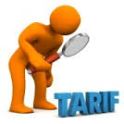Frederic Bastiat wrote that the “government is the great fiction through which everybody endeavors to live at the expense of everybody else”. Many economists have debated whether or not his statement holds truth in the light of government fiscal and monetary policy, especially on the subject of tariffs. I argue that liberties in fact, were not created by the will of the government but rather pre-existed. The government was rather created as a measure of protecting these liberties.
Tariffs are just one of the ways to regulate liberties within a country. Better known as a tax put on imported goods/ services: tariffs were created in order to protect domestic companies from foreign competition. This in turn allows the government to collect revenue from consumers who wish to import goods while allowing national companies to thrive and beat out foreign prices. Although excellent in theory, tariffs actually stir up quite an argument.
Many argue that lobbyists and special interest groups fight for either higher or lower tariffs on certain goods to profit a certain party. The question then becomes: Who creates tariffs: the government? Or are they just a mask for the lobbying groups and special interest endeavors that seek to profit from everyone else?
In light of Bastiat’s statement, I qualify that there is truth to the selfishness and fictional picture created by the government. Companies invest millions into corporate lobbying on behalf of tariffs. This lobbying in turn changes the trade policy of the government and affects national companies. It seems as though tariffs are biased towards certain industries in order to create positive changes for corporate businesses. This, overall, has a negative effect on not only the smaller, private domestic businesses but also for the voting outcome of political candidates. Many times, politicians will change their policies in order to line up with corporate lobbyists in exchange for financial contributions or “support” for their campaign. The relationship between corporate businesses and governmental officials play a vicious cycle of who can write the biggest check in exchange for the greatest change in tariff policy. Through this, it is clear that Frederic Bastiat understood the basis by which governments are run. That is, those who hold the biggest wallet and “protect” liberties only if it profits their own endeavors run the show.
On the other hand, what if there was no government structure in the first place to protect trade? Although Bastiat may be right on some level, the government in many cases as proven that tariffs help domestic companies and can in fact stimulate the economy. If governments were not in place to protect the liberties we have within our national economy then what would become of us? This is a question that has stumbled economists for years. What Bastiat ultimately underscores is that within each governmental system flaws do in fact exist. His quote brings out the corruption that can occur within every political system. What I contend is that though this may be true, his quote is flawed as well. Just as each governmental system is flawed, each individual is flawed. To say that the government exists exclusively as a mask to cover those who profit from policy would not be completely true. Not every individual has malicious, selfish intentions and not every policy created by the government is created on a basis of false morals. The truth probably lies on a middle line. Tariffs, though lobbied for by corporate business, are the same policy changes incurred by Alexander Hamilton that helped raise money for the government and spark economic growth within America.

